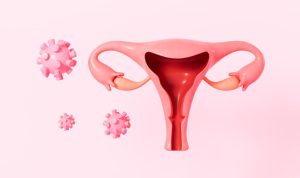Do you notice spots of brown blood during your period? Is it distinctly different from regular period blood?
If so, there’s no need to panic. It’s normal to have spots of brown period blood, and most women experience it regularly. You may also get brown blood or spotting earlier in your period.
So, what causes the brown bleeding during your period, and could it be caused by a medical problem? Let’s find out!

What Causes Brown Period Blood?
Brown period blood is usually caused by the natural variations in your period bleeding cycle. You’ll usually experience redder blood during the first few days of your period since this is when the uterine lining sheds, and Embrace sanitary pads are the perfect period partner during these days.
However, as the period progresses, the bleeding will become less frequent and may turn brown. The brown blood usually comes out later in the period, and the color is depiction that the blood took it’s time to get out of your body (its old). You can notice this color change easily on the white surface of your Embrace womanhood pads.
It’s important to remember that the color and type of bleeding during your period may vary from month to month and even within your monthly cycle. While this is usually predictable, some women may experience unpredictable bleeding, which may cause worry.
However, since these bleeding variations are a natural part of the period symptoms, there’s nothing to stress about. Here’s an infographic that every woman needs to see:

When is Brown Bleeding Normal?
Brown blood is normal if:
- It comes near the end of your period: This is the most common cause of brown bleeding amongst women and is caused by the late release of blood that’s shed during the first days of periods.
- It’s your first few periods: Teenagers are more likely to have irregular periods and brown period blood. They’re also more likely to suffer from severe period cramps. Make sure to pick the most comfortable sanitary pads as a constant companion during these days of the month.
- You’re pregnant: Pregnant women often stress out if they see blood during pregnancy, but rest assured, it’s completely normal.
- You’ve just had a baby: New mothers may also experience light brown bleeding for a few days after pregnancy.
In most cases, the bleeding will be light and similar to spotting. However, sometimes it could be caused by a medical condition, so always take note of your regular period cycles and symptoms, because it’s high time for us all to Embrace womanhood!
When Should You Visit a Doctor?
If the brown blood is irregular and doesn’t coincide with your menstruation cycle, then it could be caused by a medical condition. You should see a doctor if:
- You get a day or two of brown blood without your regular period for more than two months.
- You experience lower back or vaginal pain along with irregular bleeding.
- Your brown period bleeding accompanies heavy fever.
- You get brown period bleeding after taking certain medications.
- You experience extreme fatigue along with bleeding.
In most cases, brown period blood shouldn’t be a major problem, but visit a doctor for a checkup if you experience the above symptoms.

In severe cases, brown bleeding may be caused by:
- Uterine Infection: Infections can often cause irregular bleeding or brown blood. If you have a fever along with bleeding, you should visit a doctor.
- Polycystic ovary syndrome: This disorder may cause more severe PMS symptoms and even brown period blood.
- Cancer: To have brown blood caused by cancer is extremely rare, but it happens.
- Pregnancy: Brown blood in place of your period could indicate pregnancy. If it persists for more than one period, consult your doctor for a pregnancy checkup.
These are more severe causes of brown period blood and will only occur in a tiny fraction of menstruating women.
Brown Bleeding Before Your Period
Sometimes you may experience brown bleeding around two weeks before your period. This is called spotting and is caused by the egg released during ovulation. It’s important to differentiate between spotting and brown bleeding during your period.
Spotting will usually be sporadic and lighter, while brown blood will appear near the end of your period. Spotting is also normal, and there’s no need to worry if it happens outside your period.
However, even spotting can indicate certain medical conditions, so it’s best to Embrace womanhood without any shame visit your doctor for a checkup if it occurs in consecutive months.
How to Avoid Irregular Period Bleeding
Irregular period bleeding, brown blood, and spotting, can’t be avoided completely. Yet, you can reduce your chances of getting an irregular period by:
- Exercising regularly: Experts say that moderate exercise during your period can help you deal with the symptoms of PMS.
- Eating a Healthy Diet: Foods high in unhealthy fats or caffeine can affect your hormones during your period, which may cause irregular bleeding.
- Getting Enough Sleep: Lastly, you must get enough sleep during your period days since fatigue can cause you to experience more severe symptoms.
So, if you experience brown bleeding near the end of your period, there’s no need to worry. With a healthy lifestyle, you’ll start getting more regular periods again. During these days, pick the most comfortable sanitary pads so that you can stay stress-free while on your period.







